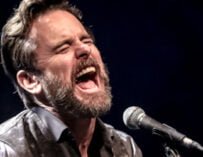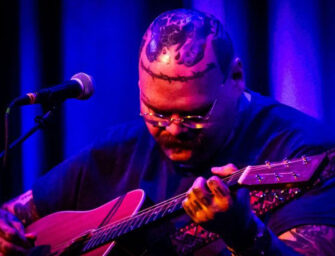
Nashville: the centre of the country music world, and more besides
On a recent trip to the US, Songwriting Magazine got to spend some time in the home of country music, Nashville
It seems as though every other press release we receive these days mentions Nashville in some capacity. Whether it’s the latest country act hailing from the city or how it was a place of inspiration for UK artists like Ward Thomas and The Shires, Nashville just keeps cropping up. We decided it was about time that we took a look for ourselves, so we packed our Stetsons and Factor 50 and headed Stateside. What we discovered was a booming city that has lots to offer all music lovers.
Nashville, or ‘Music City, USA’ as it’s affectionately known, isn’t even the largest city in the state of Tennessee – Memphis has that honour – but when it comes to music there’s absolutely nowhere else like it. For decades, it’s been home to some of the most prodigious players and prolific songwriters anywhere in the world, and its popularity continues to soar.

External view of the Country Music Hall Of Fame
For the music fan, especially the countryphile, there is so much to see. The Country Music Hall of Fame is jammed with memorabilia and charts country’s rise from its earliest roots right through to modern day sensations such as Taylor Swift and Luke Bryan. The Johnny Cash Museum and Willie Nelson General Store provide similar shrines to their heroes, complete with items such as Willie’s pool table and a wall from The Man In Black’s old house. Devoted worshippers can spend days in the company of their idols – well, in the company of their clothes, at least.

The Johnny Cash Museum
But Nashville is so much more than a rhinestone-covered mausoleum. There are roughly 150 live venues in the city: its music scene is unrivalled and it’s this beating heart which attracts tourists and songwriting hopefuls alike. And with a population that’s expected to grow by 1 million within the next 20 years, it’s very much the musician’s destination du jour.
“It’s a real community and it’s very collaborative”
Country artist Andrew Combs’ reason for coming to Nashville are typical of many. “I’ve been here 10 years,” he say. “I came because of the music scene but more importantly all my heroes came here – Townes Van Zandt, Willie Nelson, Kris Kristofferson. They all came and did the publishing deal then either moved along, or stayed. I guess I just figured I’d try it out too.”

Buskers are everywhere in Nashville
There’s also a genuine sense of community amongst the city’s population as Stacey Cato, a Music Strategy Manager at CMT (Country Music Television) explains. “When I got into town there was a whole group of country artists that were brand new and were jobless and poor – some of my best friends in this town like Randy Houser, Charles Kelly and Jamie Johnson. These were honest to goodness friends that help you out if you’re short on groceries or need something. I look back and I would say the guys that I was hanging out with 10-15 years ago are now the guys getting it done on radio. For me it’s one of the things that has actually afforded me my career at CMT.”
As part of the cast of the ABC television show Nashville, actor and musician Jonathan Jackson has had a unique insight into the city over the last three years and he agrees with Cato, “It’s been inspiring to meet all the songwriters here and just see how they really support each other. It’s a real community and it’s very collaborative, which is really amazing.”
 More than any other reason though, people come to Nashville to play, or listen to, live music. At any time of day you can take a trip down Broadway and hear the most adept musicians doing their thing. Honky-tonks such as Legends Corner, Tootsie’s Orchid Lounge and Robert’s Western World line the street, as the sounds from within blur into a dizzying mash-up of country’s greatest hits. Further afield you have venues such as The Station Inn, home to the finest bluegrass you could ever wish to hear, and anyone wanting to mix with the locals can head to the über trendy Five Points area in East Nashville. For those who want to hear new original material from the next big thing, there are songwriting circles each night all across town, where artists come together to showcase their latest work. The Bluebird Cafe is now so popular that queues form hours before any show starts, hopeful that they can grab one of the remaining seats inside.
More than any other reason though, people come to Nashville to play, or listen to, live music. At any time of day you can take a trip down Broadway and hear the most adept musicians doing their thing. Honky-tonks such as Legends Corner, Tootsie’s Orchid Lounge and Robert’s Western World line the street, as the sounds from within blur into a dizzying mash-up of country’s greatest hits. Further afield you have venues such as The Station Inn, home to the finest bluegrass you could ever wish to hear, and anyone wanting to mix with the locals can head to the über trendy Five Points area in East Nashville. For those who want to hear new original material from the next big thing, there are songwriting circles each night all across town, where artists come together to showcase their latest work. The Bluebird Cafe is now so popular that queues form hours before any show starts, hopeful that they can grab one of the remaining seats inside.
It’s with good reason, too. It was at the Bluebird where the 15-year-old Taylor Swift was first discovered, and back in 1987 it was the setting for an unsigned Garth Brooks to wow Capitol Records’ A&R scouts. These tales abound in Nashville, where the standard is so high that any bar band could end up as country music’s latest sensation. Such was the case with Rascal Flatts, once the house band at Robert’s Western World and Lonestar who performed similar duties at the Wildhorse Saloon back in the day.

The famous Bluebird Cafe
Of course not everyone can make it, and for every Taylor Swift there are thousands still trying to get themselves heard. It’s not unusual for a taxi driver to play you their latest demo or recite one of their lyrics to you as they try to perfect it, nor is it strange to see septuagenarian session musicians pacing the streets of Downtown with their contact details and instrument of choice emblazoned across their clothing. The well-known street performer Mandolin Mike has been trying to crack the bigtime for years but sadly is calling it a day. “I’ve been here since 1998 and I’m going home in July, it just hasn’t worked out as I’d planned,” he says. Many are just happy to be in Music City and have a chance to play live to its passionate crowds.
“Still one of the most prestigious stages to play in all of country music”
Known by some as “the buckle of the Bible Belt”, it’s perhaps fitting that Nashville is home to the ‘Mother Church of Country Music’, the Ryman Auditorium. Originally built in 1892 as a place of worship, the Ryman eventually broadened its horizons and allowed entertainers to perform too. Its place in musical history was sealed in 1943 when it became the home of the Grand Ole Opry, which was based there until 1974. Indeed, it was backstage at the Ryman where Johnny Cash met June Carter for the first time in 1956.
 The Opry has now moved out of town but it is still home to the same live radio show that it has been transmitting since 1925. Broadcast by WSM, it is a unique experience to witness DJs like Bill Cody introducing acts and reading out radio adverts live, and it is still one of the most prestigious stages to play in all of country music.
The Opry has now moved out of town but it is still home to the same live radio show that it has been transmitting since 1925. Broadcast by WSM, it is a unique experience to witness DJs like Bill Cody introducing acts and reading out radio adverts live, and it is still one of the most prestigious stages to play in all of country music.
Jonathan Jackson has had the honour of performing at The Opry several times. “It’s amazing to play there,” he says. “There’s just such musical history and it’s a fun environment, it’s a unique place. I’ve never really been to a venue like that where they have artists spanning different decades all coming together in this ensemble show. The audiences really want to listen and take it all in and it’s beautiful.”
Even for a current artist like Andrew Combs, The Opry holds a magical appeal. “I’d love to play the Opry, it means history to me,” he says. “I’ve never done it but people who are in my arena have done it. I still listen to it on the radio, 650 AM is the Opry. It’s still cool to hear, just knowing all the heroes that have played there. They always have a few heritage acts too, I’m glad they do that.”
“Writers are booked up two, three, four months in advance”
As well as the vibrant live scene, Nashville is also home to Music Row. Centred around 16th and 17th Avenues South, it is home to countless publishing houses, record companies and recording studios. Walking up and down the ordinary-looking roads with their offices and transformed residences, it’s hard to get a sense of what goes inside the numerous publishing companies, where hundreds of songwriters clock in each day to work on the next potential hit – an existence that’s more comparable to the life of an office worker than anything representing the rock n roll dream.
During the late 70s and early 80s, Kye Fleming was one of the city’s most successful songwriters, and as such is ideally positioned to explain this lifestyle. “In every one of those publishing companies there are multiple offices that are writers’ rooms. The writers are booked up with their appointments two, three, four months in advance. Spontaneity is a little cramped.”
Fellow songwriter Mark Cawley agrees. “We both have written in a lot of places in the world and there’s nothing like this. It’s way different to any other place you’d go to work. I think there are writers that like that ritual, they like a 9-5 feeling of going in and getting something done by 5.”

The legendary RCA Studio B
Music Row is also home to RCA Studio B, the oldest surviving studio in Nashville where over 35,000 songs have been recorded, including the Elvis classics Are You Lonesome Tonight and It’s Now Or Never as well as huge hits by the likes of Roy Orbison, The Everly Brothers and Dolly Parton. It’s an iconic piece of history in a constantly changing landscape, though many studios and publishers are now moving out of Music Row, looking for cheaper and fresher pastures in the south or east of the city.
With cranes and building work dominating much of the skyline, it is clear that the city’s popularity has rocketed in recent years. The Music City Centre convention complex opened in 2013, and new construction is leading the way in Nashville’s transformation into a thoroughly modern city. Stacey Cato has lived through these changes over the past 16 years.
“Nashville has gone through a complete evolution,” he says. “It’s always had a stronghold on the music scene but Downtown in particular is where the change has happened and it’s been a real revitalisation. Downtown in the 90s had been forgotten about. Music Row was very hot with Vince Gill, Alan Jackson, Garth Brooks, Shania Twain, Reba McEntire and those guys, so a lot of the town was focused there.”

Jack White’s Third Man Records, a key part of the contemporary Nashville scene
Cato continues: “But CMT moved Downtown in the early 00s, then shortly thereafter a whole array of construction began and other companies from Music Row started moving in. Universal Records, Creative Artists Agency, Sony/ATV Publishing… all these guys migrated from Music Row to Downtown and really did change what was happening. Downtown was not lived in ten years ago, there might have been one or two places to live in but now it’s everywhere. It’s been breathtaking to watch, I love it.”
Not everyone sees this change as a good thing, though, including Justin Townes Earle who we spoke to in December 2014 about his home city. “What Nashville means to me isn’t here anymore,” he said. “It’s buried under a bunch of crap and it’s trampled under the feet of a whole new population that’s moved here from Los Angeles. The other night I heard Sweet Child O’ Mine coming out of Tootsies, do you know how pissed off Tootsie would be if she knew that was happening? I don’t know what people are coming here for they’re not coming here to carry on a tradition of country music – they could have done what they’re doing in LA.”

Bluegrass music was born in Nashville
It’s a theme his Loose Music label mate Combs expands on. “You can’t stop change. I just wish that the buildings weren’t so damn ugly. They look like they’re going to fall down in ten years, whereas everything else that was built in the 50s and 70s is still here and still kicking. But there’s always going to be pockets of people who are trying to keep the old spirit alive. I’m not too worried about it.”
Combs is right, there is still plenty of authentic music to be heard in Nashville. Yes, this traditional entertainment may have to fight for space with college parties and tourists riding giant bicycles, ‘wooing’ their way through another Bud, but it’s still a special space.
The emergence of different sounds is also helping the city become genuinely eclectic. Dan Auerbach’s Easy Eye Sound Studio and Jack White’s Third Man Records sit comfortably alongside their country counterparts but bring a distinct garage edge with them. And the growth of hip-hop and EDM in the city, and the emergence of Tennessee Reggae, means that Nashville might truly become a Music City for everyone – even those who aren’t prepared to squeeze into a pair of old cowboy boots.
Words & pictures: Duncan Haskell
Duncan Haskell would like to thank the following for their help in making this feature possible:
Kye Fleming and Mark Cawley – iDoCoach.com
Andrew Combs – Andrewcombsmusic.com
Jonathan Jackson – Jonathanjackson.com
Justin Townes Earle – Justintownesearle.com
Stacey Cato @ Country Music Television – CMT.com
The Country Music Hall of Fame – Countrymusichalloffame.org
RCA Studio B – Studiob.org
The Johnny Cash Museum – Johnnycashmuseum.com
The Willie Nelson General Store – Willienelsongeneralstore.com
The Grand Ole Opry – Opry.com
Songwriting thanks go also to Ron Slomowicz



































Glad you had fun in Nashville and hope you come back soon. But I must point out that Opry did not move “out of town.” It’s not downtown on Broadway or Music Row anymore, but it is still very much in Nashville, a little further up the Cumberland River.
Your column did a good job of covering a variety of venues and styles. Too bad that you hadn’t visited here about ten years ago, when many people still told their “Johnny Cash story”. He and June used to show up randomly at different places and mingle with us regular folk. I met him while I was riding a bicycle down the street in my neighborhood. (He was driving through. I saw him coming and came to a stop. My stepson didn’t hear me say that I was stopping, ran into me, and we ended up in a jumble in the middle of the street. Johnny and June stopped to see if we were alright.) Thanks for mentioning the TV show “Nashville”, also.
PS: I noticed that your tags do not include Jonathan Jackson, even though he was interviewed in the column. Please add him to your tags. He is a very talented musician and actor.
Thanks Tom, Jonathan is quite rightly tagged in this post now. If you haven’t done so already, you might like to check out the review of his show here: http://www.songwritingmagazine.co.uk/live-events/live-review-jonathan-jackson-enation-nashville-22-may-15/23938